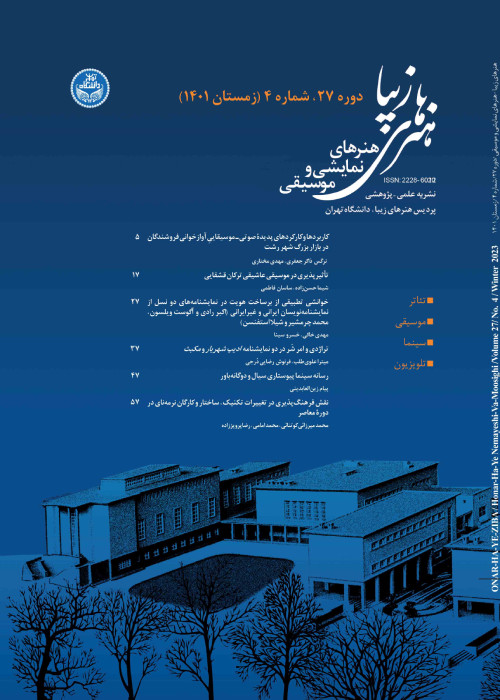A survey on Qina in singing based on Iranian musical articles (comparing " non-illegality of Qina in essence" theory with the content of Iranian song)
Author(s):
Abstract:
Appearance of music in history of human being is an innate issue. When the man started the social life and the special civilization and culture formed in the society the music as the part of human life changed in a way which got an important part of culture of nations. So we want to study music in Islamic culture. One of the most important and ambiguous issues in jurisprudence is music which is divided to song and instrumental performances. Legality and illegality of singing is discussed in Qina and playing the music in the form of lahw wa la’ib (trivial). This research discusses the singing. Therefore knowing the subject by experts (Musician) is very important to find out the commandment. The general concept of Qina has been for a long time illegal in Shiite scholars’ viewpoint. Although the generality of this illegality has been disputed for some individuals or types, no one is known to be opponent to its illegality in general sense. Sheikh-e-Tusi has argued in his book, Khilaf, that: Qina is illegal and anyone who commits this sin is fasiq and his/her testimony is not acceptable. In Qina we have two general theories: 1) Illegality by being concomitant 2) Illegality in essence. 1. Illegality by being concomitant: this theory argues that what causes the illegality of Qina or triviality of singers is that this issue is concomitant with women dancing, weltering men with women etc. and singing by itself is not illegal. 2. Those jurisconsults who believe that Qina is illegal by itself argue that sometimes the quality of a voice is subjected to be illegal no matter what is the poem, and even though the poem is legitimate. Nonetheless, as mentioned above, the well known opinion of Feidh Kashani counters this theory. He argues that qina is not illegal by itself. We discuss and analyze it in this article. It seems that the context in which the relevant sayings (al-riwayat) has been said in it supports the opinion of Feidh Kashani’s and his contemporary Mohaqiq Sabzevari’s and verifies it. As we will see in this article, the same opinion is well adapted with the reality which is the subject of this research. Albeit, we should emphasize that we are not going to prove neither theories. Moreover, the discussion about the context of riwayat is just discussed because of its necessity and relevance to the issue. In this article we analyze the first theory and define some concepts which are related to Persian music. Finally, we conclude that keyboards of singing are forms for performance of the song correctly, and these forms have no illegality in their essence. Rather, the poems (content) specify transcendentality or invalidity of what is being sung. Voice in essence hasn’t any illegality. In other words, although the form of Persian music is designed in a systematic and logical way, a man can use it in a correct way or in a false one. This article is based on the first theory which is the theory of Faydh Kashani.
Language:
Persian
Published:
Honar-Ha-Ye-Ziba: Honar-Ha-Ye Mosighi Va Namayeshi, Volume:14 Issue: 39, 2010
Page:
87
magiran.com/p924739
دانلود و مطالعه متن این مقاله با یکی از روشهای زیر امکان پذیر است:
اشتراک شخصی
با عضویت و پرداخت آنلاین حق اشتراک یکساله به مبلغ 1,390,000ريال میتوانید 70 عنوان مطلب دانلود کنید!
اشتراک سازمانی
به کتابخانه دانشگاه یا محل کار خود پیشنهاد کنید تا اشتراک سازمانی این پایگاه را برای دسترسی نامحدود همه کاربران به متن مطالب تهیه نمایند!
توجه!
- حق عضویت دریافتی صرف حمایت از نشریات عضو و نگهداری، تکمیل و توسعه مگیران میشود.
- پرداخت حق اشتراک و دانلود مقالات اجازه بازنشر آن در سایر رسانههای چاپی و دیجیتال را به کاربر نمیدهد.
In order to view content subscription is required
Personal subscription
Subscribe magiran.com for 70 € euros via PayPal and download 70 articles during a year.
Organization subscription
Please contact us to subscribe your university or library for unlimited access!


